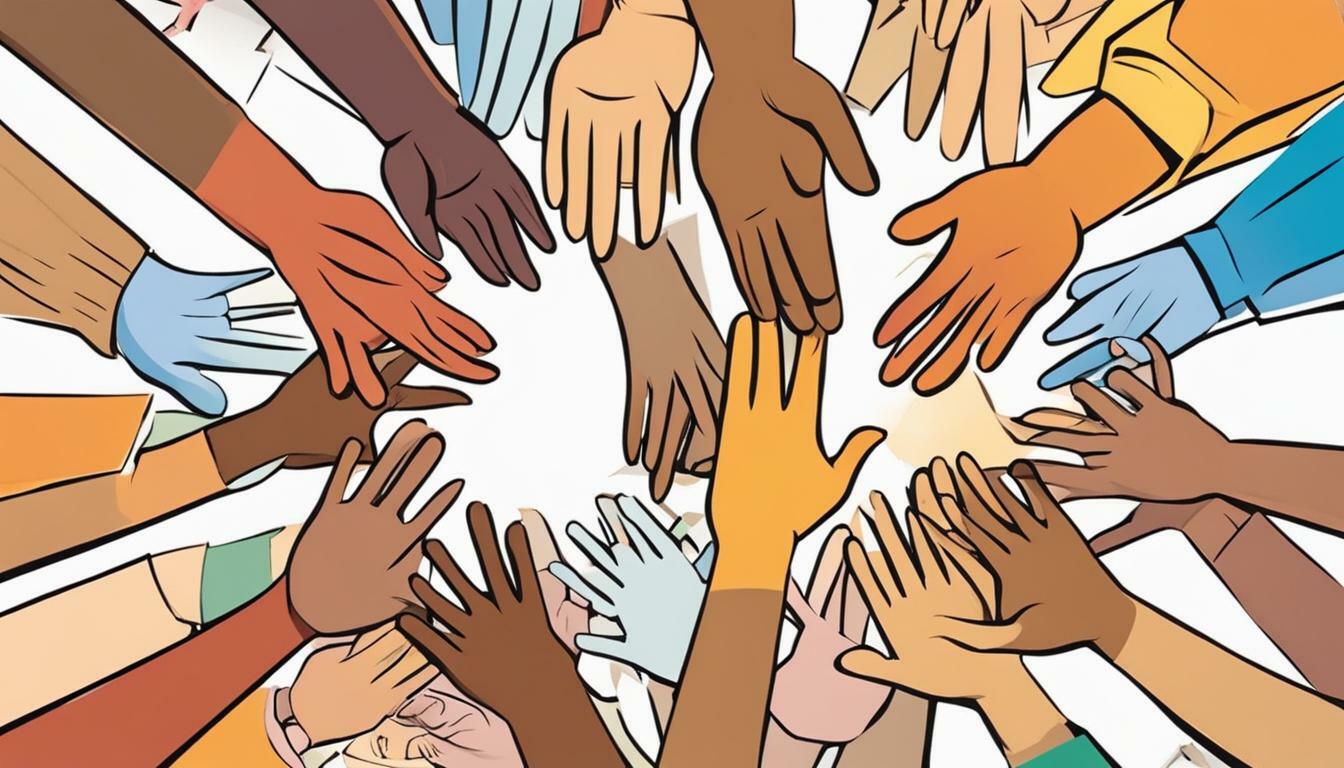Prejudice, the preconceived notion of individuals or groups based on their race, ethnicity, gender, or social status, is unfortunately prevalent in our society. As Christians, it’s crucial to understand what the Bible teaches about this harmful behavior and how to combat it.
The Bible strongly condemns prejudice and discrimination, affirming that all humans are created in the image of God and therefore deserving of respect and honor. Understanding the biblical perspective on prejudice can provide valuable insights and guidance in promoting a more just and compassionate society.
Key Takeaways
- The Bible strongly condemns prejudice and discrimination
- All humans are created in the image of God and therefore deserving of respect and honor
- Understanding the biblical perspective on prejudice can provide valuable insights and guidance in promoting a more just and compassionate society
Prejudice in the Bible – An Overview
Prejudice and discrimination are sadly prevalent in our world today. However, the Bible provides valuable insights on the importance of treating others with respect and love, regardless of differences in race, ethnicity, or social status.
Throughout the Bible, there are numerous teachings that condemn prejudice and discrimination. For instance, in Galatians 3:28, it is written, “There is neither Jew nor Greek, there is neither slave nor free, there is no male and female, for you are all one in Christ Jesus.” This verse highlights the importance of unity and equality in the eyes of God, regardless of social or cultural differences.
Prejudice and Discrimination in the Bible
The Bible also contains examples of individuals who have shown prejudice and discrimination towards others. In the book of Jonah, for instance, the prophet Jonah initially refuses to preach to the people in Nineveh because of his prejudice towards them. Similarly, in the New Testament, the Apostle Peter initially refused to eat with Gentiles until he learned that all people are equal in the eyes of God.
These examples demonstrate the dangers of prejudice and the importance of overcoming it in order to promote love and unity. As followers of Christ, it is our duty to embrace diversity and reject prejudice in all its forms.
Prejudice and Bias in the Bible
While the Bible is filled with teachings that condemn prejudice and discrimination, there are also instances of individuals within its pages who express prejudice and bias towards others. One such example can be found in the story of Jonah, who was sent by God to preach to the people of Nineveh. However, Jonah harbored a deep-seated prejudice against the Ninevites and initially refused to go, believing they were unworthy of God’s mercy.
“But Jonah was greatly displeased and became angry. He prayed to the Lord, ‘Isn’t this what I said, Lord, when I was still at home? That is what I tried to forestall by fleeing to Tarshish. I knew that you are a gracious and compassionate God, slow to anger and abounding in love, a God who relents from sending calamity.'” – Jonah 4:1-2
Another example can be found in the story of the Good Samaritan. In this parable, a Jewish man was beaten and left for dead on the side of the road. Several people passed by but refused to help him, including a priest and a Levite. It was ultimately a Samaritan, a group who were despised and considered inferior by the Jews, who stopped and showed kindness to the injured man.
These stories serve as a reminder that even those who are considered righteous in the eyes of God can be susceptible to prejudice and bias. However, they also highlight the importance of recognizing and addressing these biases in order to promote love and acceptance for all.
Prejudice in Christianity
Prejudice has unfortunately affected Christian communities throughout history, leading to division and discord. From the Inquisition to the Crusades, Christianity has been used to justify acts of prejudice and violence. However, these actions are inconsistent with the teachings of Jesus and the principles of Christianity.
Jesus himself showed unconditional love and acceptance to all, regardless of their background or social status. He challenged social norms and prejudices by associating with outcasts and speaking out against injustice. In fact, one of his most famous parables, the Good Samaritan, demonstrated the importance of loving your neighbor, even if they were from a different culture or religion.
“So now I am giving you a new commandment: Love each other. Just as I have loved you, you should love each other. Your love for one another will prove to the world that you are my disciples.” – John 13:34-35 NLT
Despite Jesus’ teachings, prejudice has persisted in the Church throughout history. However, there have also been many individuals and groups who have worked to counter this trend and promote inclusivity and acceptance.
The Civil Rights Movement, for example, was largely led by Christian leaders such as Martin Luther King Jr., who drew inspiration from the teachings of Jesus to fight for racial equality. The movement also drew support from African American churches, who used their faith as a basis for resistance and advocacy.
In recent years, there has been a growing movement within Christianity to promote inclusivity and acceptance of all individuals, regardless of their race, gender, or sexual orientation. Many churches have taken steps to become more welcoming and affirming, and there has been a growing recognition of the importance of diversity and representation within Christian communities.
Overall, while prejudice has unfortunately been a part of Christian history, it is important to remember that it is not consistent with the teachings of Jesus or the principles of Christianity. By embracing love and acceptance, Christians can work towards building a more just and inclusive society.
Overcoming Prejudice with Biblical Principles
Prejudice and intolerance have been a part of human history since the beginning of time. However, as Christians, we are called to love our neighbors as ourselves and to treat others with respect and kindness – regardless of their background or beliefs. Here are some biblical principles that can help us overcome prejudice:
- Love one another: John 13:34-35 states, “A new command I give you: Love one another. As I have loved you, so you must love one another. By this everyone will know that you are my disciples if you love one another.” When we love others unconditionally, we are less likely to judge them based on external factors such as race, religion, or socioeconomic status.
- Forgiveness: In Matthew 6:14-15, Jesus teaches, “For if you forgive other people when they sin against you, your heavenly Father will also forgive you. But if you do not forgive others their sins, your Father will not forgive your sins.” Forgiveness allows us to let go of grudges and biases, and enables us to see others in a new light.
- Embrace diversity: Galatians 3:28 declares, “There is neither Jew nor Gentile, neither slave nor free, nor is there male and female, for you are all one in Christ Jesus.” God created us all with unique backgrounds and experiences, and by embracing diversity, we can learn from one another and grow in our faith.
It is important to recognize that overcoming prejudice is not a one-time event, but rather an ongoing process. By actively applying these biblical principles in our daily lives, we can work towards a more inclusive and loving society.
Consequences of Prejudice According to the Bible
Prejudice is a harmful and destructive force that can have serious consequences on individuals and society as a whole. The Bible provides numerous examples of the negative impact of prejudice and discrimination.
For instance, the story of the Good Samaritan (Luke 10:25-37) teaches us that we should not judge people based on their social status, race, or ethnicity. The Samaritan, who belonged to a despised minority group, showed compassion and acted with kindness towards a Jewish man who had been beaten and robbed, whereas the Jewish priest and Levite passed by him without helping.
Similarly, James 2:1-13 warns against showing favoritism to the wealthy and powerful and discriminating against the poor. The passage states that “if you show partiality, you are committing sin” and “judgment will be without mercy to anyone who has shown no mercy”.
Furthermore, Galatians 3:28 reminds us that in Christ, there is no distinction between Jew and Gentile, slave and free, male and female, for we are all one in Christ Jesus. This powerful verse emphasizes the importance of treating all people with equality and respect, regardless of their background or social status.
Overall, the Bible teaches us that prejudice and discrimination are harmful and sinful behaviors that go against the principles of love, compassion, and justice. If we want to create a better world, we must actively work to combat prejudice and promote inclusivity and acceptance.
Challenging Prejudice and Discrimination Through Faith
As people of faith, we are called to stand against prejudice and discrimination. The Bible is clear in its condemnation of such attitudes, and we are to follow its teachings.
One example of this can be found in the story of the Samaritan woman in John 4. Jesus, a Jewish man, speaks to a Samaritan woman, breaking down the racial and cultural barriers between them. This challenges the prejudices of his disciples, who were surprised that he was speaking to a Samaritan. Through this story, we learn that we are called to love and serve everyone, regardless of their background or ethnicity.
“There is neither Jew nor Gentile, neither slave nor free, nor is there male and female, for you are all one in Christ Jesus.” – Galatians 3:28
Another example can be found in the parable of the Good Samaritan in Luke 10. In this story, Jesus tells of a man who was beaten and left for dead on the side of the road. Several people passed him by, but it was a Samaritan, a group that the Jews had great prejudice against, who stopped to help him. Through this story, we learn that our prejudices can blind us to the needs of others, and that we are called to show compassion to all people, regardless of who they are.
By rooting our actions in the teachings of the Bible, we can work towards challenging and combating prejudice and discrimination in all its forms.
- Related keywords: prejudice and discrimination in the bible
The Role of Community in Tackling Prejudice
Prejudice is a deeply ingrained societal issue that can be difficult to overcome on an individual level. That’s why it’s important to recognize the role that community plays in combatting prejudice and promoting inclusivity. In fact, addressing prejudice requires a collective effort that involves engaging with diverse communities and fostering understanding.
Through community interaction, individuals can challenge their own biases and learn to appreciate and celebrate diversity. By breaking down stereotypes and promoting cross-cultural exchange, community engagement can help combat prejudice and bias.
“Therefore welcome one another as Christ has welcomed you, for the glory of God.” – Romans 15:7
The Bible teaches us to love and welcome all people, regardless of their race, ethnicity, or social status. By following this guidance, we can create a community that is inclusive and accepting of all.
It’s important to seek out opportunities for dialogue and learning, including participating in diversity and inclusion workshops, attending cultural events, and engaging in interfaith dialogue. By listening and learning from others, we can gain a deeper understanding of different experiences and perspectives.
Through community involvement and education, we can create a more just and inclusive society, free from prejudice and bias.
Unity and Love: The Antidotes to Prejudice
Prejudice is a divisive force in our society, causing harm and pain to individuals and communities. The Bible offers valuable teachings on how to combat prejudice and promote understanding and unity. Biblical teachings on prejudice emphasize the importance of love, compassion, and inclusivity.
The book of James teaches us that “if you show partiality, you are committing sin” (James 2:9 ESV). This verse reminds us that prejudice is not only harmful but sinful. As Christians, we are called to love one another unconditionally and reject discrimination in all its forms.
“For there is no distinction between Jew and Greek; for the same Lord is Lord of all, bestowing his riches on all who call on him” (Romans 10: 12 ESV).
The Apostle Paul reminds us that in the eyes of God, there is no distinction between races or cultures. We are all equal in the eyes of the Lord. This principle should guide us in our interactions with others, treating everyone with love and respect.
The book of Galatians teaches us that “there is neither Jew nor Greek, there is neither slave nor free, there is no male and female, for you are all one in Christ Jesus” (Galatians 3:28 ESV). This verse reminds us that our identity is rooted in Christ, not our race, gender, or social status. Therefore, we must strive to create inclusive communities that embrace diversity and reject prejudice.
Overcoming prejudice requires a willingness to embrace others and recognize the value of different perspectives and experiences. As Christians, we are called to love our neighbors as ourselves, and this means extending compassion and understanding to all people, regardless of their background or beliefs.
- Practice empathy
- Challenge your own biases
- Listen to others with an open mind
- Stand up against discrimination and hate speech
Let us pray that we may be empowered to act against prejudice and promote unity and love in our world.
Prejudice: A Barrier to Spiritual Growth
Prejudice is not only harmful to society but also has spiritual implications. When we hold prejudice and discriminate against others, we hinder our connection with God and stunt our spiritual growth. The Bible warns us against harboring prejudice and challenges us to love one another unconditionally.
“There is neither Jew nor Greek, there is neither slave nor free, there is no male and female, for you are all one in Christ Jesus.” – Galatians 3:28
This verse reminds us that all people are equal in the eyes of God, regardless of race, gender, or social status. To truly love our neighbors as ourselves, we must reject any biases that prevent us from seeing them as equals.
Furthermore, when we hold prejudice, we fail to reflect the character of God, who loves all and is just. The Bible commands us to seek justice and love mercy, and this cannot be done while holding onto biases.
“He has told you, O man, what is good; and what does the Lord require of you but to do justice, and to love kindness, and to walk humbly with your God?” – Micah 6:8
We must actively work to overcome our biases and prejudices, recognizing that this is a lifelong process. Seeking the guidance of the Bible and the Holy Spirit, we can challenge our own perspectives and grow in our love for all people.
The consequences of prejudice extend beyond the individual and impact society as a whole. By actively addressing and combatting prejudices, we can work towards building a just and inclusive society that reflects the love and justice of God.
“Let love be genuine. Abhor what is evil; hold fast to what is good. Love one another with brotherly affection. Outdo one another in showing honor.” – Romans 12:9-10
Let us strive to live with genuine love and honor for all, rejecting the harmful effects of prejudice and discrimination in order to grow spiritually and build a better world.
Building a Just and Inclusive Society
In order to build a just and inclusive society, it is important to actively challenge and unlearn biases. Prejudice and bias in the Bible are not only condemned, but it is also made clear that they can lead to negative consequences. It is up to us as individuals to combat prejudice and create a more loving and accepting world.
One way to do this is to engage with diverse communities and strive to foster understanding. By breaking down barriers and stereotypes, we can learn to see each other as individuals and appreciate our differences.
The Bible teaches us the power of unity and love in dispelling prejudice. Embracing these teachings, we can reject prejudice in all its forms and strive to treat others with unconditional love and respect.
Additionally, we must recognize the spiritual implications of harboring prejudice. Prejudice hinders our spiritual growth and our connection with God. Through reflection and addressing our own biases, we can deepen our faith and connection with God.
Ultimately, each of us has a role to play in building a just and inclusive society. By advocating for equality and justice in our communities and actively challenging and unlearning biases, we can work towards a world free from prejudice and intolerance.
“So in everything, do to others what you would have them do to you” – Matthew 7:12
“There is neither Jew nor Gentile, neither slave nor free, nor is there male and female, for you are all one in Christ Jesus” – Galatians 3:28
- Engage with diverse communities to foster understanding and break down stereotypes
- Reject prejudice in all its forms and strive to treat others with unconditional love and respect
- Reflect on and address our own biases to deepen our faith and connection with God
- Advocate for equality and justice in our communities
Conclusion
In conclusion, the Bible has a strong stance against prejudice in any form. The teachings of the Bible emphasize love, compassion, and acceptance towards all individuals, regardless of their race, ethnicity, or social status. As discussed in this article, prejudice has negative consequences on individuals and society as a whole.
To combat prejudice, it is important to actively challenge our biases and unlearn them. Embracing the principles of love, forgiveness, and diversity can help us overcome our prejudices and foster a more inclusive and just society.
Furthermore, faith can empower us to stand against prejudice and discrimination. The Bible offers numerous examples of individuals who stood against prejudice and inspired change. As we strive to challenge prejudice in our communities, we can draw strength from these examples and find inspiration in our faith.
In summary, the Bible teaches us to reject prejudice and embrace love and unity. By actively applying these teachings in our daily lives, we can build a society that is free from prejudice and discrimination, and one that celebrates diversity and promotes inclusivity. Let us all work together to make this a reality.




